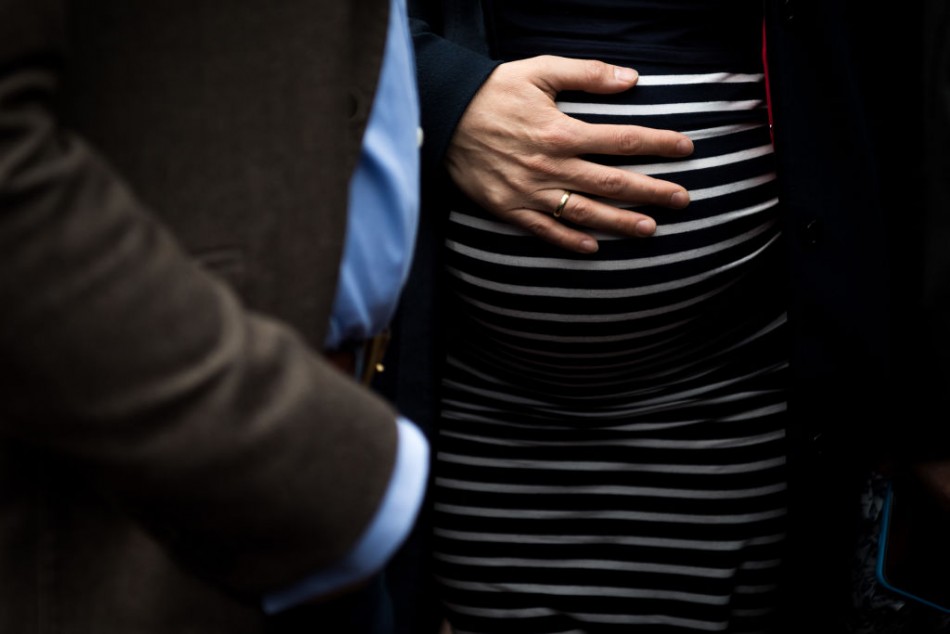HELLP Syndrome: Why Moms Must Not Ignore Nosebleeds While Pregnant

First-time mom Krissy LePage was in the last few weeks of her pregnancy when she experienced a concerning episode. Though nosebleeds while pregnant are pretty common, she decided to go to the hospital when her blood dripped through her nose since she was also running a fever.
LePage had elevated blood pressure during her pregnancy, but she managed to keep this under control before this episode, per her essay on Today's Parent. After some tests, the doctors told LePage that she had developed HELLP syndrome, also known as Hemolysis, Elevated Liver enzymes and Low Platelets syndrome, and was advised to rest and take it slow.
The mom said that despite the absence of other symptoms, she was also told she's a high risk for preeclampsia. However, blood work further confirmed that LePage's kidneys and liver were failing; thus, they needed to get her baby out as soon as possible. A C-section was risky for her condition as the doctors thought she could bleed out, so they decided to induce her pregnancy.
Read Also: Texas Mom Gives Surprise Birth to Sixth Baby After Feeling She Was 'Just Bloated'
HELLP Syndrome: Signs to Watch Out For
LePage had to gather all her strength to push the baby out without an epidural. When her healthy son was born, the mom was still not out of the woods. By some miracle, she managed to walk around the hospital the day after the delivery and felt a lot better.
Things normalized for her after getting a blood transfusion and staying on blood pressure medication for a few weeks. Despite her first-pregnancy experience, LePage had twins a few years later and also developed HELLP syndrome with some nose bleeding.
According to Healthline, nosebleeds while pregnant happen in 20 percent of pregnancies or one in five pregnant women. Ideally, it's most common and not worrying during the first few trimesters as the body's blood vessels start to expand due to the extra blood for the child growing inside.
However, a nosebleed coupled with other symptoms like fever or flu, high blood pressure, blurry vision, headaches, swelling of the hands or face, and pain while breathing could indicate HELLP syndrome, which is a disorder of the blood. This is a rare occurrence in five to eight percent of pregnancies, and it's usually evident during the second trimester. It may lead to the mom having anemia as her cells aren't transporting the blood with oxygen properly to the rest of her body.
Today, the AJOG recognizes World Preeclampsia Day. AJOG shares this mission to educate and disseminate world class research and clinical insight into preeclampsia, HELLP Syndrome, & hypertensive disorders of pregnancy. 2021 Preeclampsia Supplement: https://t.co/qjdP5CJKEw pic.twitter.com/llbeQHMIq3
— AJOG (@AJOG_thegray) May 22, 2021
Some moms may mistake HELLP syndrome as gastritis or a gall bladder condition, but it is linked to preeclampsia. Not all pregnant moms with HELLP syndrome will exhibit the signs of preeclampsia, just like what happened to LePage.
Treatment for HELLP Syndrome
According to Preeclampsia.Org, the best treatment for HELLP syndrome is to have the baby and deliver the placenta. The mom might also need a blood transfusion to increase her platelets and plasma. Outcomes are much better if the mother had early intervention and good management of the symptoms.
There are not enough ways to prevent HELLP syndrome, but mothers can increase their chances of a healthier pregnancy if they have a physical check-up before having a baby and regularly go to their prenatal. Women who've had HELLP syndrome are more than likely to experience it again for the next pregnancies at 16 to 52 percent.
Related Article: Dry Air May Cause Nosebleeds in Kids; Here's What Parents Must Do
© 2024 ParentHerald.com All rights reserved. Do not reproduce without permission.
